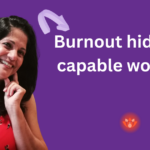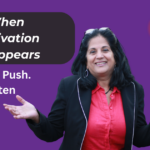Meet Martha. From the outside, her childhood looked perfectly respectable.
Her parents ran a successful business and lived in a nice home. Money was managed wisely, but you cannot outthink emotional exhaustion.
No one would have guessed the truth behind closed doors. Her mother was an alcoholic, sometimes absent, sometimes unpredictable. Her father, overwhelmed by work, tried to hold everything together but often disappeared into busyness. That busyness made his behaviour abrupt, sharp and not empathetic. If they went on holiday, her mother would wander off and she and her sister would look for her and spend the time worrying instead of enjoying themselves.
And Martha? She was the dependable one, the caretaker, the child who learned not to have needs.
By age ten, she was looking after her younger sister, keeping the house “presentable” and ensuring no one ever knew how fragile it was.
Because her parents prized one thing above all: perfection.
Appearances were everything. No one must suspect there was anything messy, let alone broken.
The Hidden Legacy of “Just Coping” leads to emotional exhaustion.
If you asked Martha back then, she would have said:
“I’m fine. I’m just coping.”
But here’s what most people never see: When you grow up in a home where emotional truth is denied or hidden, where chaos is carefully packaged as normal, your nervous system doesn’t learn how to rest.
It learns how to scan. How to brace. How do you anticipate everyone else’s needs before your own?
Because, as a child, Martha wasn’t just managing tasks. She was managing everyone’s feelings.
And this is the part that often gets overlooked: Emotional neglect isn’t always loud and can only lead to emotional exhaustion. Sometimes, the absence of being seen and soothed leaves the deepest imprint.
What Happens When the Body Never Learns Safety
As Martha grew older, her coping skills became her identity. She was the “high-functioning one, ” the achiever who always had it together.
But inside? She was exhausted in ways she couldn’t explain. She couldn’t relax.
Couldn’t be present. Her nervous system still lived in that house, where perfection mattered more than connection.
Even in adulthood, every small failure felt dangerous. Every conflict felt like a threat. Every moment of rest felt undeserved.
Why You Can’t Just “Move On”
We often hear: “The past is over. Let it go.” But here’s the truth:
Your nervous system doesn’t let go of what it has never processed.
Your logical mind can understand the timeline. “It happened years ago.” But your body doesn’t track years. It tracks safety vs. threat. So when Martha faced stress in her business or relationships, she defaulted to the same survival strategies she learned as a child:
✅ Overfunctioning
✅ People-pleasing
✅ Hiding her struggle
✅ Numbing with work
This isn’t because she was broken. It’s because her body protected her the only way it knew how.
“You don’t have to keep proving you’re okay. You deserve to feel safe simply because you exist.”
Why Emotional Exhaustion Isn’t Weakness
Emotional exhaustion isn’t a sign that you can’t handle life.
It’s a sign you’ve been handling too much alone for too long.
And most importantly: It’s not in your head. It lives in your nervous system.
No amount of mindset work or intellectual understanding can rewire a body that still feels unsafe.
What Emotional Neglect Really Teaches You
When children grow up with unpredictable or emotionally unavailable parents, they internalise powerful lessons:
🌀 Keep everything looking perfect.
🌀 Don’t let anyone see behind the curtain.
🌀 Your needs are too much.
🌀 Stay small. Stay quiet. Stay useful.
Over time, these lessons become the background hum of adulthood, driving anxiety, emotional exhaustion, overachievement, and chronic fatigue
A New Approach: Orienting to Safety
Healing doesn’t start with trying harder. It starts with showing your nervous system something it has never seen: that the present is not the past.
One of the simplest ways to begin is to orient.
Orienting is a natural process all mammals use to scan the environment and confirm safety.
When you practice it intentionally, you are gently telling your body:
“You don’t have to brace anymore. We are not in that house.”
Try This: 60-Second Orienting Practice.
If you feel yourself tensing or spiralling:
1️⃣ Look Around Slowly.
Let your gaze gently move across the room.
2️⃣ Choose One Neutral or Pleasant Object.
A plant, a soft light, a familiar photo—anything that feels safe.
3️⃣ Notice Three Details.
Its colour. Its shape. Its texture.
4️⃣ Exhale Longer Than You Inhale.
Feel your feet on the ground.
Let your shoulders drop.
5️⃣ Repeat This Reminder:
“I am here now. I am safe to be present.”
What to Remember
You are not dramatic. You are not failing. You are living with a body trained to survive, not rest. Healing isn’t about erasing where you came from.
It’s about teaching your body that you don’t live there anymore.
If you’ve been trying to outthink your emotional exhaustion, this is your invitation to try something different:
🌿 More curiosity.
🌿 More presence.
🌿 More gentle repair.
“Healing isn’t about forgetting where you came from. It’s about teaching your body that you don’t live there anymore.”
If you want to chat, book a call or check out my ‘Calm from The Inside Out’ Mastery program.






